
Negotiations, Part 5:
August 22, Tuesday – Witte Ignores Tsar, Journalist Photos
The formal session was postponed one day because minutes of the prior session were delayed. Meanwhile, on Tuesday, Witte received a telegram from the Tsar rejecting Komura's compromise plan and ordering the break of negotiations if the Japanese continued the money and land demands. As a result of Roosevelt's back channel initiative, Witte pocketed the telegram, in effect ignoring the Tsar's orders to break off the negotiations on the grounds that he had to await the result of the Tsar's meeting with Roosevelt's envoy Meyers. With both the Russians and the Japanese sending and receiving messages to their home governments, Tuesday's meeting was postponed until Wednesday, August 23, when it was believed that the final demands and positions should be received.
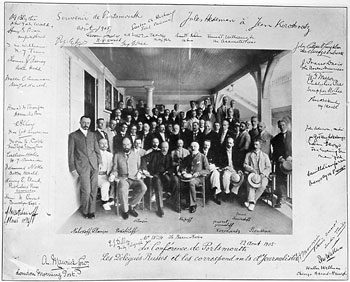
The Russians pose on the Wentworth porch with members of the press. Portsmouth Athenaeum collection. View larger image.
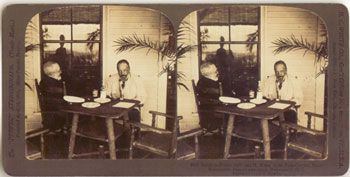
Rare stereopticon card of Witte, right, and Rosen on the Wentworth porch. Courtesy Kristi Donahue. View larger image.
Both delegations are photographed separately with the international journalists at the Wentworth.
August 23, Wednesday: Witte Delays Negotiations; Social Events at Niles Cottage and the Wentworth
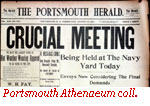 Portsmouth Herald headline: Crucial Meeting Being Held at The Navy Yard Today: Envoys Now Considering the Final Demands.
Portsmouth Herald headline: Crucial Meeting Being Held at The Navy Yard Today: Envoys Now Considering the Final Demands.
At a private meeting held before the formal session, Komura again discussed his compromise plan offering to sell back to Russia the northern half of Sakhalin for 1.2 billion yen and dropping the war expenses language. Without replying formally to the offer, Witte asked if Komura's proposal could be implied to mean that if Russia gave up the entire island, would the Japanese be willing to drop the request for money? Komura replied in the negative and Witte had cleverly placed the Japanese in a position risking the continuation of the war over a payment of money. Witte again said Russia would not pay any indemnity and Komura stated that Japan would not accept a treaty without an indemnity even if Sakhalin were ceded in entirety. Clearly the entire peace process was in jeopardy, but Witte suggested postponing the next formal meeting until Saturday, August 26, "because an unexpected new situation has arisen in the meantime." The new situation was Meyer's call on the Tsar.
The delegates then agreed in formal session to delay the next meeting until August 26th. Both Witte and Komura knew of the Meyers' meeting with the Czar and, by the delay, were hoping to save the conference through some compromise. At Roosevelt's request, Ambassador Meyer again visited the Tsar, who finally agreed to cede the southern half of Sakhalin to the Japanese but rejected any payment for the northern half.
During the afternoon, members of both delegations attended a lawn party at Christ Church, and that evening, while Witte was at a piano recital at the Wentworth, the Japanese, including both Komura and Takahira, were dining at the Niles' cottage at a state dinner arranged by Secretary Peirce and Mrs. Peirce with Governor McLane, William Dean Howells, and other local guests. The Tenth Artillery Corps Band again played at the occasion.
August 24, Thursday: Tsar's Decision; York Harbor Social Event
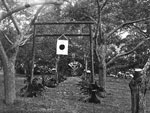
The garden at the Perkins home was decorated for the “Japanese fete.” Old York Historical Society. View larger image.
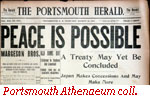 Portsmouth Herald headline: Peace Is Possible: A Treaty May Yet Be Concluded.
Portsmouth Herald headline: Peace Is Possible: A Treaty May Yet Be Concluded.
Witte received a telegram stating that the Tsar finally agreed to the partition of Sakhalin, but rejected any indemnity and said there were to be no more concessions.
York and York Beach continued to be popular destinations for both delegations. On this day, Witte and the Russians and Komura and the Japanese journeyed to the York Harbor home of Mrs. Newton Perkins at Sewall's Bridge to attend a Japanese fete. The grounds were decorated with American and Japanese flags, a dragon and small parasols, and a temple complete with a statue of Buddha. More than 700 guests were treated to a judo demonstration. Later Komura donated $1,000 to the Old York Historical Society and the York Hospital. Witte donated $100 to the hospital and the York Historical Society.
Later that evening, Komura dined at the Wentworth with Denison and other Japanese delegates and former New Hampshire Senator Chandler and his son. Denison, who had grown up in Lancaster, New Hampshire, had known the Chandlers when he worked in Washington, D.C.
August 25, Friday: Back Channel - Roosevelt meets Kaneko; Amoskeag Mills Visit
Roosevelt aware of Tsar's rejection of any indemnity, met again with Kaneko and strongly advised the Japanese to reconsider their indemnity demand; but Roosevelt neglected to mention the Tsar's willingness to give up one-half of Sakhalin. Roosevelt apparently thought the Japanese would only consider one-half of the island if the Russians paid for it. The next day the Japanese government indicated to Roosevelt it would consider his recommendation to reduce the amount of the 1.2 billion yen indemnity.
Both the Japanese and Russian delegates were invited by Governor McLane to visit Manchester, New Hampshire, to view the Amoskeag Mills, the largest textile complex in the world. The Russians declined the offer, but Komura and many Japanese delegates accompanied the governor on the tour and dined at Derryfield Club with many New Hampshire politicians and local notables.
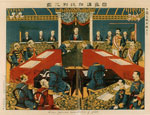
A fanciful Japanese illustration of the conference room and the deliberations shows Roosevelt at center although he never came to Portsmouth. View larger image.
August 26, Saturday: Impasse; Japanese Delay
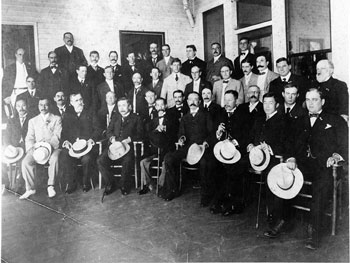
The Japanese pose on the Wentworth porch with members of the press. Portsmouth Athenaeum collection. View larger image.
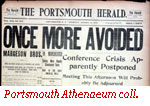 Portsmouth Herald headline: Once More Avoided: Conference Crisis Apparently Postponed.
Portsmouth Herald headline: Once More Avoided: Conference Crisis Apparently Postponed.
Witte and Komura met again on Saturday, first in private, and Komura asked if the Russians had a reply to his offer. Witte said the compromise was rejected. When Komura asked Witte if he had any proposal, Witte said no payment of any kind would be considered and he had come to the meeting to end negotiations. Witte may have also said that the Tsar would give up one-half of Sakhalin but in that private conference Komura apparently did not understand that offer and did not report it to Toyko. Komura wanted to delay the conference further to give more time for a compromise; he said he still did not have final instructions from Japan and wanted a formal reply from the Russian government on the compromise plan. The delegates then went into formal session and delayed the next meeting until Monday, the 28th. Komura wired Tokyo saying that if the Russians failed to meet the final demand on the 28th, he wanted to return to New York.
While messages shuttled between Portsmouth and the two countries, and between Roosevelt and his diplomats in Russia and Kaneko for Japan, apprehension was growing that the negotiations would end without agreement.
The official international press corps was banned from formal negotiations. The delegates released little information in their official formal reports to the press other than what terms were settled and the time of the next meeting. The press got what information they could by mingling with the delegates at the hotel and social excursions, such as the Mayflower trip. By now the delays in the conference and intense telegraph activity indicated that the conference was at an impasse. In the next two days the press learned by the activities of the Russians that their positions were hardening and from the Japanese that they were upset by their government's instructions, which meant a change in the Japanese position. Both delegations obtained valuable information from the press and neither delegation wanted to be held responsible for a breakdown in the negotiations.
Witte received another telegram from the Russian Foreign Ministry stating that there were to be no more concessions and, although it was important to spare the amour propre of Roosevelt, it was more important "to stand on guard for the welfare and honor of Russia."

